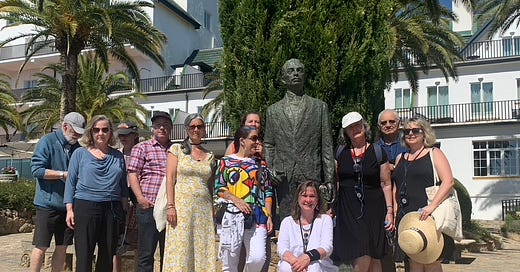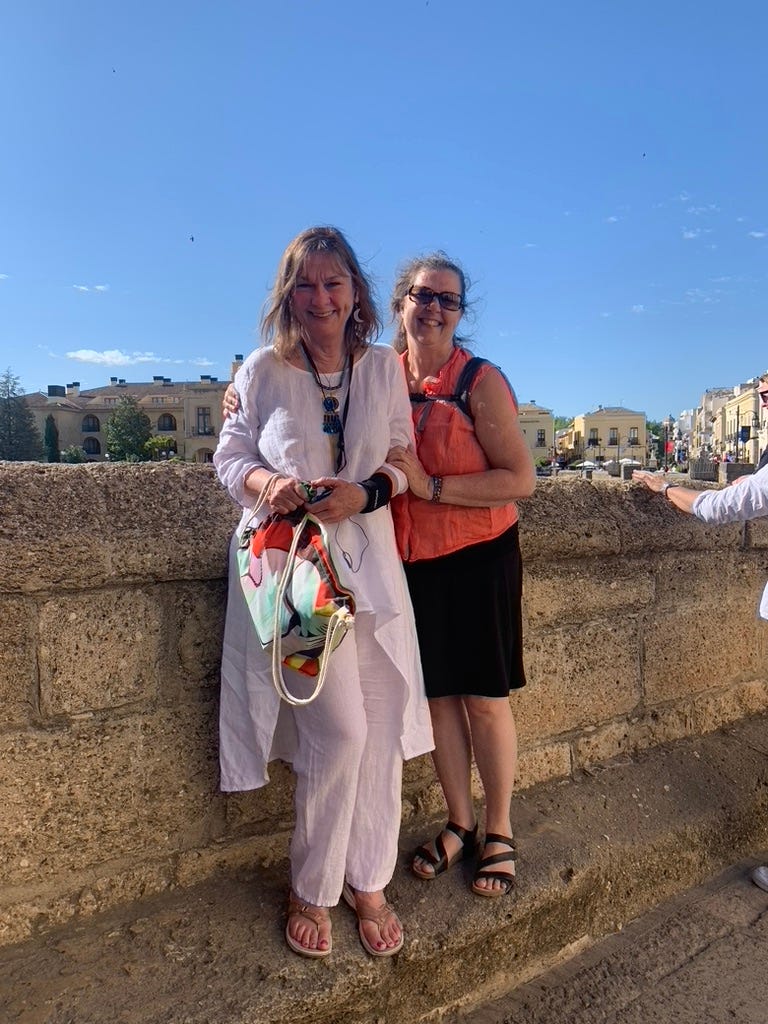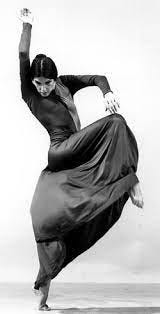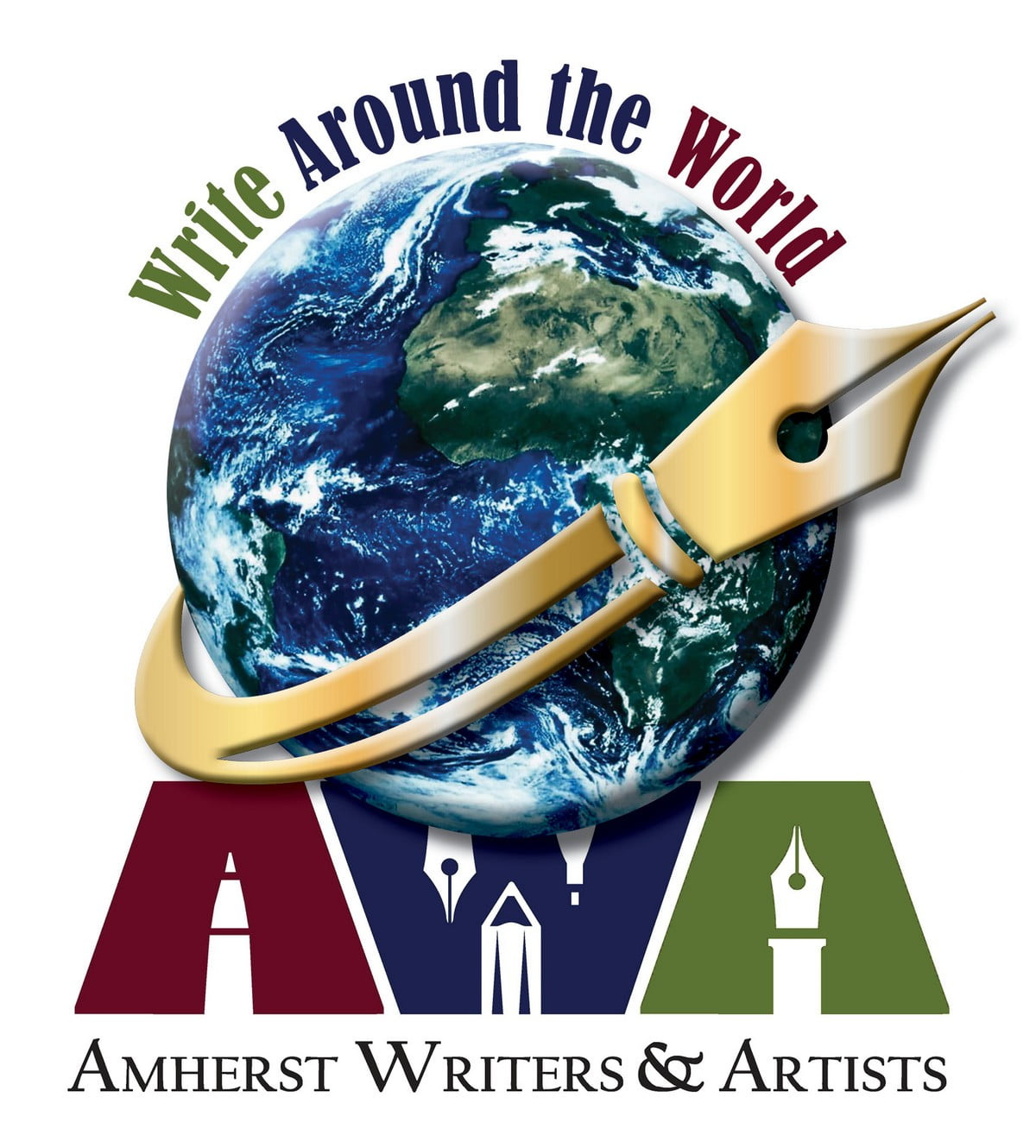Ronda. What to say about Ronda?
Rilke and the gang
I organized a tour with Tours by Locals, with Maike, a woman I’d been in conversation with since 2019 when I first planned this trip for 2020. She was marvellous, taking time to give us an impression of what the Queen Victoria Hotel may have been like when Rilke stayed there. She showed us places frequented by Hemingway and Orson Welles, who apparently detested one another. (So much so that when they erected statues at either side of a commemorative walkway, they had to switch the positions to have them face away from each other.) Another fun fact is that Orson Welles’ ashes were taken out of the city and dumped in a well. (We only hoped that it was no longer in use.)
Esana and me at the famous “new bridge”
Near the end of our very warm and magnificent tour, we were shown a lookout spot where we could see the “old bridge,” a more modest (and actually newer than the so-called old bridge). In any case, the nugget of information that stayed with me is that there is a stairway that goes up from the river about 40 floors or so, and that water was handed up bucket by bucket to the palace at the top. I’m not a history buff, but these details stay with me because they evoke an immediate response, ie: how many slaves, peasants, workers, etc., had that job of standing on a step all day long passing jugs of water up and empty ones down?
All the conquering and overcoming and war information goes in and out again. From paleolithic times to the Visigoths, Islam, Christianity, and back again, it seems. A historic zipline through Andalusian trade routes, Columbus, horses, bulls, and matadors, to nuns who sold sweets behind a wooden turntable, and who could see out through latticework but were hidden from view. It’s all a bit dizzying on an afternoon walk. These shifts in civilization can be seen in most of the architecture—minarets’ half-moons replaced by crosses, and vice-versa.
What Spain Was Like
One of the poems I offered as a prompt at the end of the week was Pablo Neruda’s “What Spain Was Like.” It was written during the Spanish Civil War, which incidentally isn’t mentioned in our historical tour. I suggested we write about what Spain was/is like for us personally.
There was stretching and being, eggs and oranges (that come all the way from here), and then gathering—writing words, deep, deep listening in the breeze and sun, faces of those I’ve come to love as deeply as these days can allow—their voices, cleverness, honesty. Then food, marvellous food—purple beets that tasted of earth, memory bleeding into egg and cream, divine fuchsia scent.
Then our driver, Miguel, returned to take us along ropes of narrow highway, swinging through gorges and wrapping hills of endless dusty green olive trees. To arrive, at last, in Ronda to meet Maike and walk and walk, under hot, hot sun and blessed shade, through the streets and over the ancient bridge, past the bullring, until at last, we arrived at Ronda Flamenca.
Because she was marvellous; because she was pure fire, electric, fierce, feminine; because her hips, her hips—god, her hips, the mysterious power in them; because the drive of her feet in blood-brown shoes, the heartbeat of them—the heartbeating of pain, yearning, rage, terror, and grief; because of her, rosettes in shimmering black hair, hands like wings, like emptiness, like generosity, I found myself beyond. Beyond myself. Not a tourist being entertained, but just for a moment, I was transported. I’m not trying to pretend I understood the history or the story being told, and not the elusive duende we’d come to explore, so I could write an impressive poem.
Lorca: “…that too hasty a profit snatched from approaching loss…”
“…trying to hold it firmly in our simple hands…”
But in those suspended moments when the mind stopped and the belly softened, something visceral and real got in. The tears were nothing. But with them came Trish, beloved one who used red in her dances, and I longed to sit with her in her living room on Withrow Avenue to speak of this. She tried to tell me, to share what flamenco is, what Lorca spoke of, because she knew. So now I was desperate to be able to truly listen, having now felt this dance on this evening. Because of Ronda Flamenca, the song, the guitar, the hips, hands, and feet, I remember Trish and my heart heaves with everything all at once.
I was innocent, or more truthfully, ignorant when I arrived. I had a vague image of sun on stone, crumbling walls, dancing in the streets, doorways imbued with history, as if I knew what that was. I didn’t. How could I? So I told myself to pay attention. To listen.
And there I was, still am, in fact, in elegant places with taps that pour hot water into my hands, lights that flick bright at the press of a finger, and not porting a pail of water up a hundred metres for a prince to bathe his feet.
I tell my feet to listen to the stories beneath the stones. But I feel so young, naïve, and foolish here. When the singer opens himself or the guitarist’s fingers play wild and controlled, or the dancer sits in her precise way, this is not entertainment. This is art. This is history. I only feel it as a shudder or series of shocks in the spine. I am new-born. As a Canadian my ancestral history is somewhat of a mystery. My grandmother a Texas Belle, my other grandmother a Northern Ontario settler before Cochrane was Cochrane. All of them passed through the mists of time from Scotland, England, Ireland, and France.
What was Spain like?
It was a classroom, an admonishment, a revelation.
I wonder at the part of me who wants to witness the bullring,
“…the only art in which the artist is in danger of death and in which the degree of brilliance in the performance is left to the fighter’s honor.” ~ Hemingway from Death in the Afternoon.
I’m fascinated by how the essential need for food evolved into a spectacle and art form, and ultimately, a cultural identity. I want to see the grace of the matador, the ferocity of the bull.
So perhaps what Spain has done is shaken loose some ancestral marrow, not of my specific bloodline but of something more ancient and instinctual that I cannot name with any accuracy.
Spain has spun me, wrung me, shamed me, opened me, and made me cry.
And so much more is yet to come.
Oh boy, is that ever true!
On Tuesday May 16th, I will be leading a writing workshop as part of AWA’s Write Around the World series, from 12:00 to 2:30 pm EDT (Toronto time).
A Write Around the World workshop event invites beginner, emerging and seasoned writers to experience a writing workshop that holds safe and creative space using the Amherst Writers & Artists Method. This is also a once-a-year fundraiser to support the social justice programs offered by AWA.
Registration is by donation – $20, $15, or $10.
Click here or visit https://bit.ly/WAW-2023 to register.









